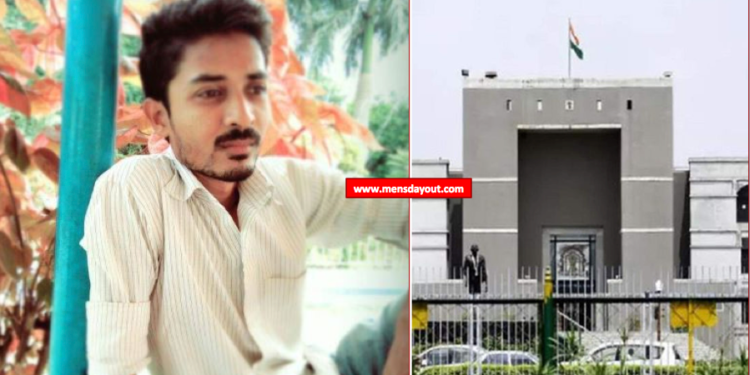Gujarat high court on Monday, stayed the order of arrest for a woman accused of pressuring her son-in-law to end his life. The mother-in-law had been allegedly demanding permanent alimony of Rs 5 lakh along with additional Rs 2 lakh for her daughter.
The woman moved high court through her Advocate who reportedly reversed the case, and later HC ordered the stay of the woman arrest.
Background
In the last week of June, 31-year-old, Nilay Sanjaybhai Chaudhary, ended his life by strangling himself at his home. He was a resident of Navdurga Society, Bardoli who was found dead on June 26.
Initially, the reports suggested that it was an accidental death, and the police too registered the same accordingly. However, while investigating further, the information which came out from the boy’s family was that Nilay ended his life as his wife did not return from her matrimonial home.
ALSO READ –
“50% Of CISF Jawans Die Because Of Suicide Due To Family Related Issues”: CISF DG (2018)
The police officer also checked Nilay’s phone during investigation, which is when he learnt of a video message that the husband had left before ending his life. Nilay had mentioned everything in the video giving reasons why he chose to end his life. The video also revealed the name of his mother-in-law, Parulben Ganeshbhai Chaudhary, clearly stating that she ruined his life by constantly demanding money.
On learning her son’s last video, Nilay’s mother Ramilaben Sanjaybhai Chaudhary registered an abetment to suicide case with the Bardoli police against her son’s mother-in-law.
Mother-in-Law Moves Court For Bail
The mother-in-law moved high court through advocate Shakeel Qureshi, who argued that his client was not wrong in asking for permanent alimony of Rs 5 lakh. Qureshi insisted that this money would have been used towards her daughter’s welfare.
The accused woman’s advocate also stated that demanding permanent alimony was not a crime. There were ongoing court cases for the couple with regards to divorce and maintenance as well. Also, Qureshi said,
The son-in-law was living separately from her daughter and was at his paternal home for the last three years.
ALSO READ –
Double Murder & Suicide | Man Kills Wife In Bengaluru, Mother-in-Law in Kolkata; Then Ends Own’s Life
Qureshi cited a 2015 high court order, to point out how an FIR for abetment to suicide against a woman, was quashed. That particular woman’s husband had died of suicide leaving behind a note stating that he was “killing himself because he was fed up with the court cases his wife had filed against him.”
The advocated based his arguments in Parulben’s case resting on these points, stating that matrimonial disputes cannot be made a base to slap charges of abetment to suicide.
Justice A J Desai stayed the Parulben’s arrest till September 21 after hearing the case. The court also admitted her petition and permitted the investigation to continue further.
Alimony Demand
The couple got married in 2017. However, Nilay’s wife, Kaamini, constantly fell ill after which she used to visit her parents home and live there for days. When Nilay went to bring her back on one occasion, the enter family of his wife quarrelled with the in-laws. Nilay then stayed with his wife in her parents’ house for three months.
Nilay’s mother-in-law was constantly pressuring him for Rs 5 lakh. She was also demanding Rs 2 lakh cash additionally from Nilay, as stated in the video.
Our Take:
- Demand for dowry is illegal in India, however, demand for alimony becomes rightfully legal, eventhough it can drive men to end their lives
- Lets observe the case above – married in 2017 and by mother-in-law’s own admission, couple was living separately for past three years, which means the marriage barely lasted for few months
- Despite the same, demanding a ransom without any basis is totally legal in India
ALSO READ –
“From Hell To Heaven”: Elderly Couple Commit Suicide Alleging Harassment From Son, Daughter-In-Law
- As per Indian laws, if a wife is found dead under mysterious circumstances within seven years of marriage, husband is arrested immediately with or without any evidence
- However, in Nilay’s case, eventhough he left a video message of the trauma he faced from his wife and mother-in-law, the woman has been given relief by high court
- According to the arguments on which the high court has relied, one can only infer that if a woman dies, it is the fault of a husband, however, if a man dies, matrimonial laws cannot be blamed
ALSO READ –
http://voiceformenindia.com/in-the-news/husband-suicide-india-gujarat/
We are now on Telegram. You can also join us on our Facebook Group
Join our Facebook Group or follow us on social media by clicking on the icons below
If you find value in our work, you may choose to donate to Voice For Men Foundation via Milaap OR via UPI: voiceformenindia@hdfcbank (80G tax exemption applicable)






























